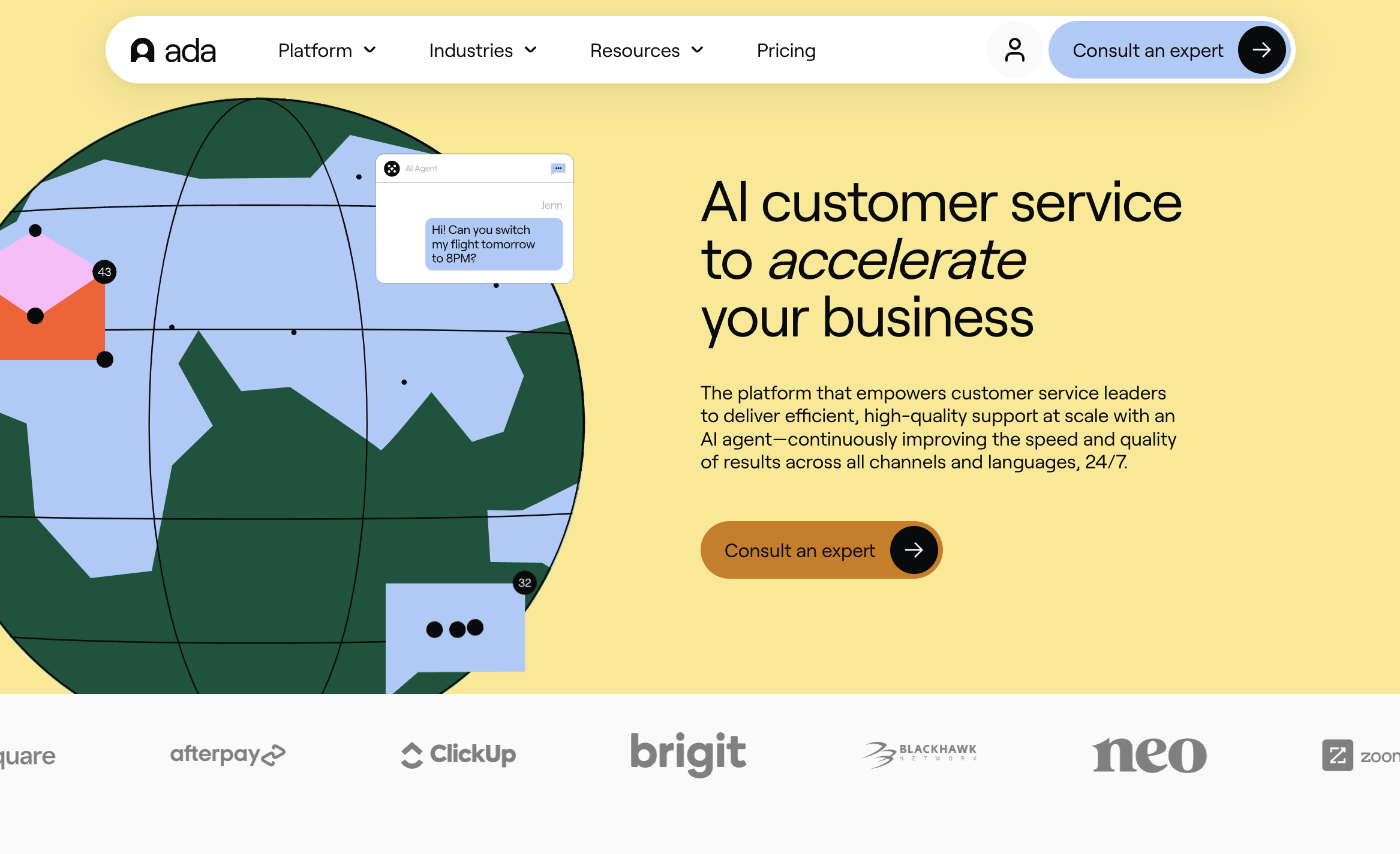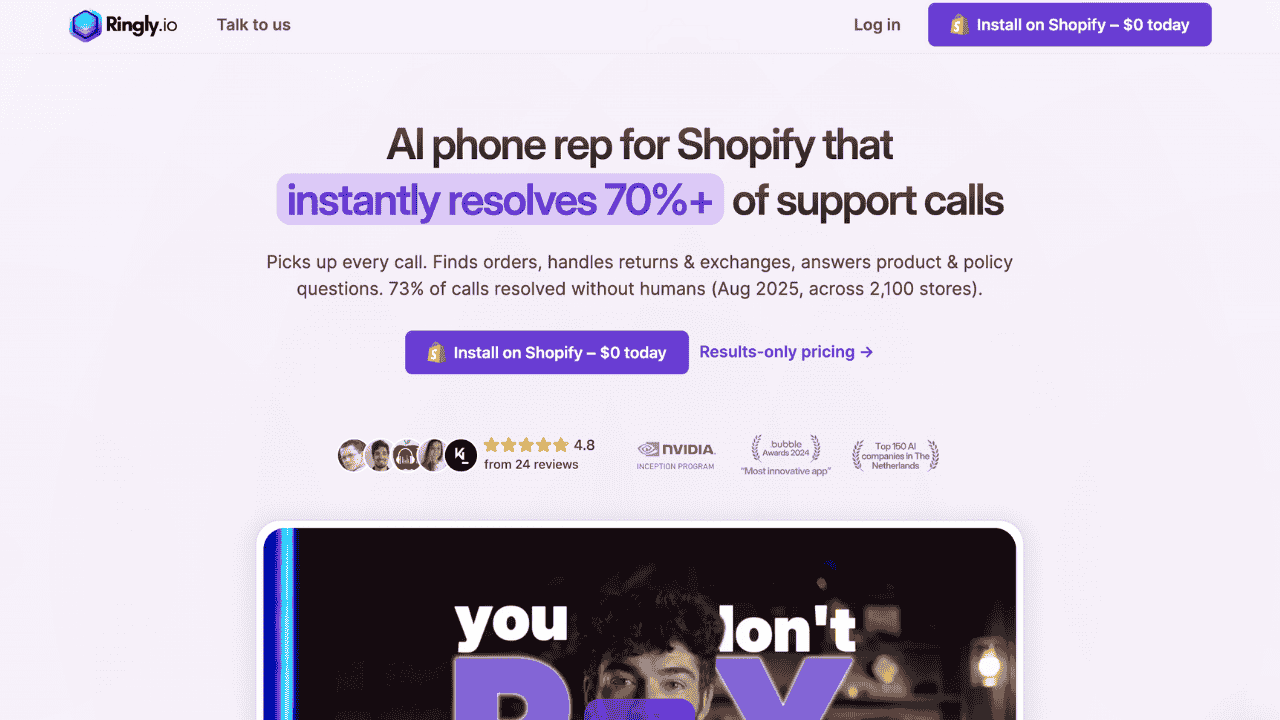Confused by crowded dashboards or mysterious pricing when picking a chatbot solution?
This guide will walk you through everything you need to know so you can make a confident decision that fits your business. We’ll cover:

Fin AI serves a wide range of clients, including major global brands, with its key features such as rapid setup, integration across multiple support channels (tickets, email, live chat), adherence to existing workflows and automations, escalation to human agents when needed, and continuous performance improvement powered by the proprietary Fin AI Engine.
Also read: Best Fin Alternatives
Pros
Cons

Ada was founded in 2016 by Mike Murchison and David Hariri, focusing on AI-powered customer service software designed to help businesses automate and scale their customer support.
With a user base spanning numerous industries, Ada offers features like AI chatbots, seamless integrations with CRM systems, and customizable workflows that empower customer service teams to handle inquiries efficiently.
Pros
Cons
Note: The pricing information below is accurate at the time of writing and may be subject to change. For the most up-to-date pricing, please visit each company's pricing page.
Ringly.io has simple, usage-based pricing with no hidden fees or long-term commitments. Test drive it risk-free for 14 days, then scale up or down on month-to-month terms, or book a demo for fully tailored enterprise support.
"Game-changing self-serve" – Anonymous, Support Lead
Fin has noticeably reduced our ticket volume and allowed our team to focus more on high-value conversations... Its natural language understanding is impressive, customers rarely feel like they're interacting with a bot...
"Pricing gets steep fast" – Anonymous, Enterprise Admin
It’s affordable at low volumes, but once our bot hit the upper plan, the monthly bills exploded—pricing gets steep fast for enterprise volumes...
Other reviewers praise quick deployment, accurate contextual answers, and strong analytics. Main drawbacks include occasional hallucinated replies, manual integration work, and advanced features locked behind premium tiers.
No online reviews available from major platforms as of July 2025. Prospective users should request demos or references to evaluate Ada directly.
Ringly.io is known for its simplicity, and a focus on e-commerce, with features like order status lookups. It has a 4.8 star rating from 12 reviews on Product Hunt and other platforms.
"it stands out significantly ahead" - Bertrand, Director. We are at the initial stage of testing and have made only a few calls so far. Consequently, I have rated the product with four stars for now. However, I must express that the product has shown significant promise. When compared to competitors, it stands out significantly ahead.
"This is such a great product" - Jim Miranda, Founder. This is such a great product. I have been with you for less than a week and already closed 3 deals with it."
"It really sounds like a human" - Laix, Founder. Tried Ringly.io today and the quality of the phone calls surprises me! It really sounds like a human, and it reacts really fast. Will need to deploy it in action to see the full capabilities.
"How to automate customer service? -> Ringly.io" - Sidra Husnain, Founder.

Best for Shopify stores looking for the best way to offer 24/7 AI phone support at a fraction of the cost.
How it went when I tried setting up Ringly:
After I installed the Shopify app, the only thing I had to do was to upload my data to the knowledge base. (website was uploaded automatically)
After I did that, I could already speak to my agent via a web call.
Setting it live was as simple as picking a phone number with my area code from the dashboard. I was able to connect the number with 1 click. (The number is also free and included)
There was not really anything else to the setup.
They claim that out of the box, their agents resolve an average of 73% of support calls. They back that up with data from over 2,100 active Shopify stores.
Signup -> onboarded took only 4 minutes and 12 seconds. Most of that time was spent waiting for the knowledge to be uploaded.
Over the first 2 weeks I used it (14-day free trial), it resolved 76% of my calls on its own.
The rest of the calls were escalated to a support ticket by my agent.
(update: the more calls you get, the smarter it gets. As of today, my resolution rate is 79%.)
Standout Features (pros):
Pricing is on a results basis; you don't pay until your agent has at least a 60% resolution rate
Shopify integration is native. It will allow your agent to solve order status and refund requests on the phone.
Reviews are overall very positive, mainly because of the results-based pricing. If you don't pay unless you get results, every customer gets results.
Cons:
What’s unique about Ringly is that it is the first AI phone support tool built for Shopify.
Editors note: Ringly.io opened 5 spots for Shopify stores to pay $0 until AI resolves 60% of your support calls. You can book a call to claim it.
Choosing the right AI support platform is key for modern businesses, especially in e-commerce, where customer satisfaction and sales are directly linked to streamlined, automated experiences. Let's quickly recap what each platform offers and when you should use them.
Ready to see how effortless automation can be? Get started with Ringly.io for free today, and give your customers support that truly sets you apart.